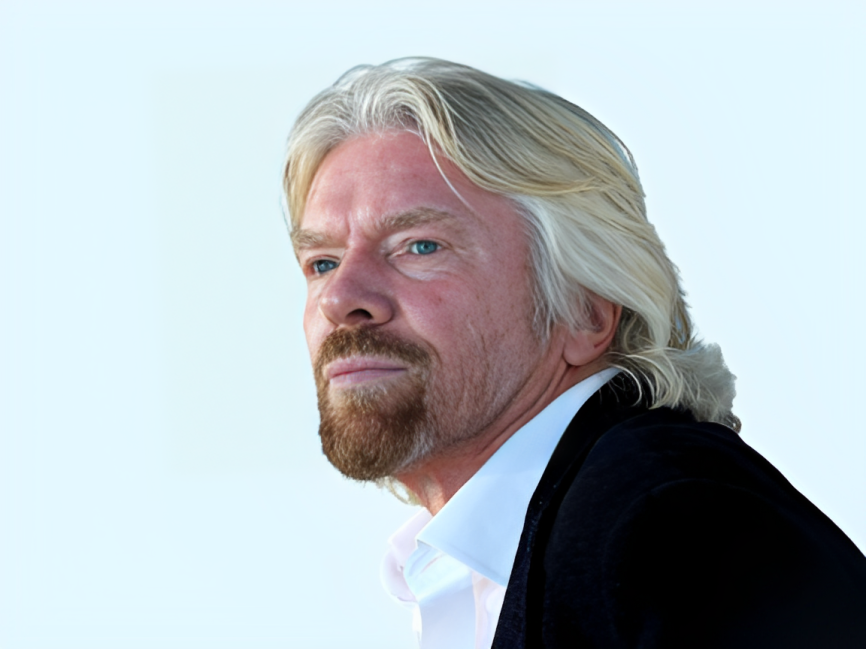The article explores the early days of Virgin Group and the obstacles it successfully overcame, offering valuable lessons that entrepreneurs can glean from the experiences of its founder, Richard Branson.
Virgin Group founder Richard Branson has made a lasting impression on the corporate world with his risk-taking endeavours and client-focused philosophy. Branson upended the music business by starting Virgin Records and growing the Virgin brand to include over 400 businesses in many industries. Branson’s resilience and strategic insight are demonstrated by his capacity to spot market possibilities, confront crises head-on, and overcome failures. This article will delve into the inspiration behind the Virgin brand, the challenges it encountered, and the valuable lessons shared by Richard Branson with aspiring entrepreneurs.
I. The Birth of Virgin
Virgin Records, Richard Branson’s mail-order record company, laid the groundwork for the launch of the Virgin brand in 1970. Branson’s passion for music and his determination to disrupt the traditional record industry fueled the inception of this idea. In an effort to provide customers with a unique experience, Branson opted to sell albums at discounted prices through direct mail.
II. Overcoming Obstacles
Financial Limitations:
During the early years of Virgin, Richard Branson faced significant financial challenges. Nevertheless, he demonstrated resourcefulness and tenacity by adopting unconventional approaches to secure financing and establish alliances. An example of his ingenuity was selling records directly from the trunk of his car to generate income.
Industry Disruption:
Virgin often encountered opposition and skepticism when venturing into established sectors. Richard Branson, in particular, faced resistance from influential record labels in the music industry. However, he remained persistent, taking calculated risks and challenging the status quo. Through his determination and innovative approaches, Branson successfully established Virgin Records as a dominant force in the industry.
Legal Challenges:
Branson faced conflicts and legal challenges along his journey. One notable instance was when a rival record label filed a lawsuit against Virgin Records, alleging copyright violations that posed a threat to the company. However, Branson’s tenacity and commitment to safeguarding the interests of his business led to a favourable resolution of the situation.
III. Lessons from Richard Branson
Bold and Daring Entrepreneurship Lessons:
He serves as an inspiration for others to take calculated risks, think outside the box, and strive for ambitious goals. Branson’s willingness to embrace uncertainty and push the boundaries sets an example for entrepreneurs, encouraging them to explore uncharted territories and pursue their visions with determination.
Prioritise Customer Experience:
He has always emphasised the significance of providing outstanding customer experiences. He adheres to the principles of putting consumers first, comprehending their problems, and offering creative solutions. Entrepreneurs should take inspiration from Branson’s customer-centric strategy and concentrate on establishing trusting bonds with their target market.
Accept Failure and Learn from It:
According to Branson, the business path is not complete without failure. He sees it as a chance to develop, learn, and adapt. Entrepreneurs can use a similar strategy.
Create a Strong Company Culture:
Branson recognizes the importance of cultivating a supportive and empowering work environment. He advocates for an open, transparent, and innovative culture within the Virgin Group. His emphasis on nurturing a positive culture that encourages talent and fuels creativity can provide valuable insights for business owners, highlighting the significance of creating a workplace that fosters collaboration, trust, and continuous innovation.
IV. Motivating and Vital Questions
How did Richard Branson manage to expand Virgin into such diverse markets as travel, telecommunications, and space travel?
Branson identified opportunities in various industries where he believed he could disrupt and bring about positive change. Leveraging the Virgin name and reputation, he entered new markets, often challenging established competitors and offering customers innovative and unique propositions.
How did Branson respond to crises and setbacks like Virgin Atlantic’s financial problems and the SpaceShipTwo crash at Virgin Galactic?
Branson showed courage and determination in the face of difficulty. To keep his businesses afloat, he looked for innovative solutions, formed partnerships, and took calculated decisions. Entrepreneurs can gain insight from Branson’s capacity to overcome difficult circumstances and come out stronger.
In conclusion, Richard Branson’s entrepreneurial journey with Virgin exemplifies his boldness, customer-centric approach, determination, and ability to disrupt markets. Entrepreneurs can draw valuable lessons from his audacious strategies, customer-focused mindset, and willingness to embrace failure. Branson’s experience serves as a testament to the possibility of building successful and impactful companies through perseverance, innovation, and a clear vision.

